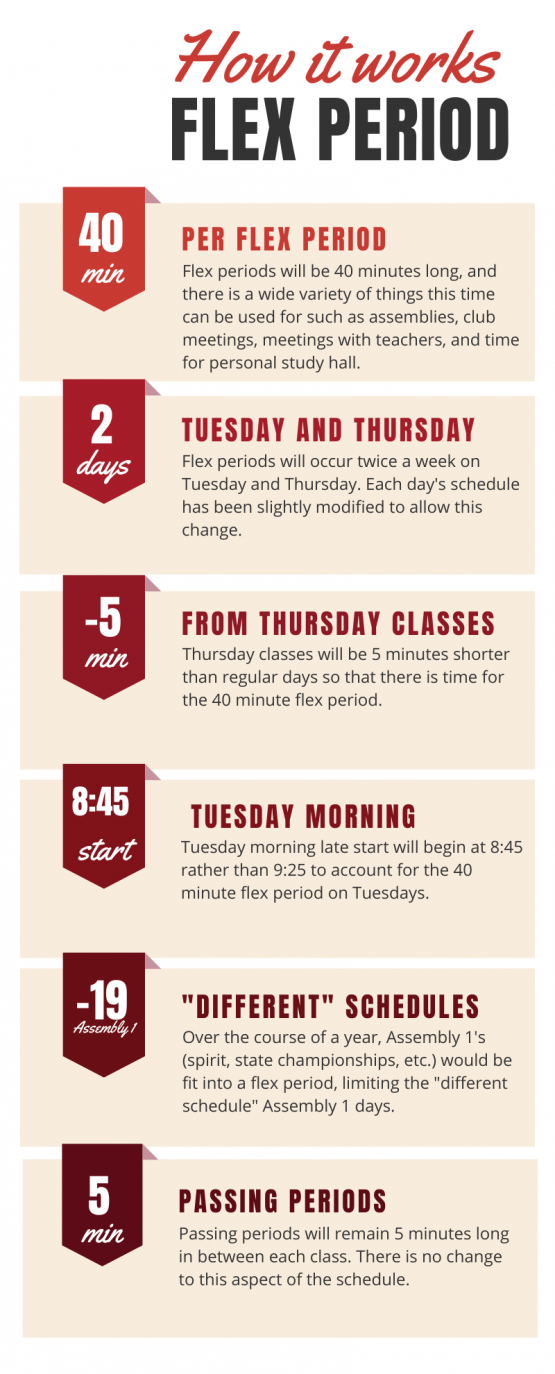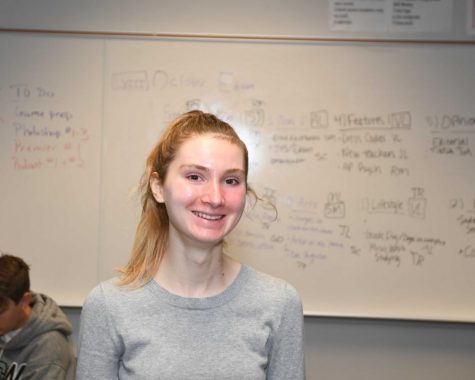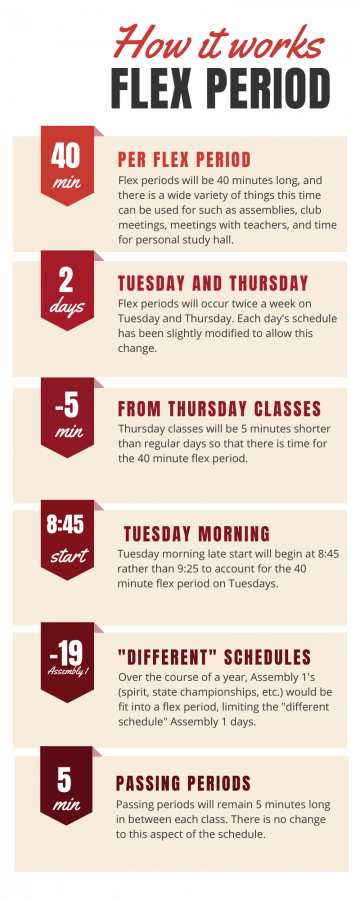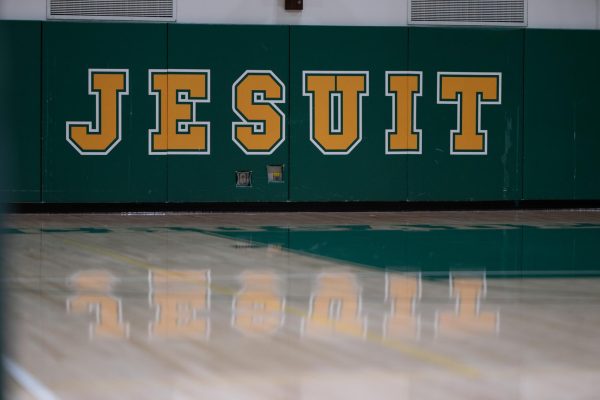Bell schedule adds “flex period” for upcoming year
Bell Schedule altered for 2020-2021
Beginning in the 2020-21 school year, Jesuit will adopt a new bell schedule that contains a few notable changes. The most major update to the schedule will implement two “flex” periods, longer breaks where students may meet with teachers, work on homework, or meet with friends, on Tuesdays and Thursdays.
To accommodate Tuesday’s flex period, school will begin at 8:45 a.m. on Tuesdays, as opposed to 9:25. Occupying those additional 40 minutes on Tuesdays will be a 40-minute flex period in the middle of the day.
Thursdays will also have an embedded 40-minute midday flex period. School will still begin at 7:45 a.m., but each class will last only 50 minutes to accommodate the flex period, which will occur after 2nd period in lieu of break.
Many elements of the bell schedule will remain the same. School will start and end at the same time on Monday and Wednesday-Friday. Passing periods will still be five minutes, and each class will still meet 4 times per week. The rotation of 7th period and the placement of Friday Mass also remain untouched.
While the changes to the bell schedule are relatively modest, a faculty-based bell schedule committee who designed and finalized the new schedule hopes that flex periods will offer students a much needed chance to rest or organize themselves twice a week. The committee relied on research, insights from other Jesuit and Oregonian high schools, and faculty and student input to make its final decision.
A committee is still determining exactly what the flex periods will involve, but it’s anticipated that students will have a faculty advisor and a homeroom to check in to before dispersing. Students may use the period to work on homework or schedule longer meetings with a teacher during the school day.
Assemblies can be programmed into a flex period if they are shorter or only pertain to one grade level. Flex periods provide a natural window for assemblies and virtually eliminate the need for assembly schedules 1, 3, and 4, according to the bell schedule committee report.
At the core of the administration’s and faculty’s rationale for flex periods is student wellness. The bell schedule committee’s report cited a fishbowl discussion with 10 students in which many of them reaffirmed the importance of break for relaxing and spending time with friends or for organizing themselves before their next class period. Twice-weekly flex periods extend the downtime break offers, giving students the opportunity to address their mental health, visit their counselors, and manage their stress levels.
“At least one day a week we really do want there to be downtime or free time,” Principal Mr. Hogan said. “Part of what we really want to develop is students’ ability to manage their free time efficiently because you’re going to have a lot of it in college and you don’t have a lot of it right now.”
Jesuit’s faculty and administration have been deliberating if and how to alter Jesuit’s bell schedule for over two years. The process began with a faculty committee who determined whether the schedule should change at all.
“Jesuit’s unusual in that we have not significantly changed our bell schedule for 30 years,” Mr. Hogan said. “Most schools evaluate and shift their schedule every 5-10 years. We felt like our schedule works pretty well, and there are a few things in there that are important to us. The reason we really entered into the process is that we could see for a variety of reasons that students and staff felt our schedule is a bit frenetic, especially as we continue to add programs and courses.”
After the initial faculty committee decided Jesuit should change the bell schedule, another faculty committee, chaired by Vice Principal of Academics and Student Life Ms. Hagelgans and English Department Chair Mr. Falkner, compiled information to determine specific changes the new bell schedule should adopt. The 10-person committee included at least one teacher from each department, a counselor, and an administrator.
The bell schedule committee drafted a final report that stated conclusions agreed upon by a majority of members. Each conclusion garnered either unanimous approval or had only one dissenting vote.
One major consideration the committee debated was whether to change school start and end times by moving them back approximately 30 minutes every day. While the committee recognized teenagers increasing struggle with sleep deprivation, they concluded that moving start times back would likely incentivize more before-school activities. The final committee report argued that moving start times back would only promote sleep for the student body if before-school activities were restricted, a step that the school currently doesn’t plan to take.
The 2020-21 bell schedule has not yet been publicized to students, but some students have been informed by faculty of planned changes. For senior Kavya Ravishankar, flex periods provide a useful time for conferences with teachers and assemblies, but she questions how scaling back Tuesday’s late start will affect students.
“I think the students who have the current Tuesday schedule are used to coming in at a certain time [on Tuesdays],” Ravishankar said. “They’re going to have to adjust how they balance their Monday-Tuesday work and schedules.”
Junior Amreen Sandhu embraces the attempt by the administration to recognize student’s wellbeing as well as the time management benefits of the new schedule.
“I like the idea of flex periods,” Sandhu said. “I think it’s an attempt by the school to value students personal wellbeing. A lot of teachers are unavailable during lunch, and break is too short for us to ask teachers questions while taking time for ourselves.”


Shawna Muckle, 17, is a senior at Jesuit High School. She has been a member of the Chronicle staff for three years in various capacities, and she is currently one of its chief editors. Shawna is fascinated by politics and government, and she enjoys writing articles for the Chronicle pertaining to local and national political developments, alongside issues tied to social justice and personal identity. Some of her favorite pieces she’s written include a feature on Jesuit students’ experience with microaggressions, a recap of the 2018 midterm elections, and an article discussing last year’s clerical abuse scandal within the Catholic Church. Outside of journalism, Shawna is the leader of Jesuit’s Model United Nations club and a member of her school’s Ethics Bowl team, which was a 2019 national champion. Shawna is also a Precinct Committee Person for the Washington County Democrats. In her free time, Shawna can be found aggressively running up hills, drinking boba, and yeeting off on road trips to Seattle (for unspecified reasons). Ask her about her opinions on Congress, specifically a) Republicans and b) the crisis with the federal deficit. In the future, Shawna hopes to pursue journalism in college and, later on, as a congressional reporter in DC.








